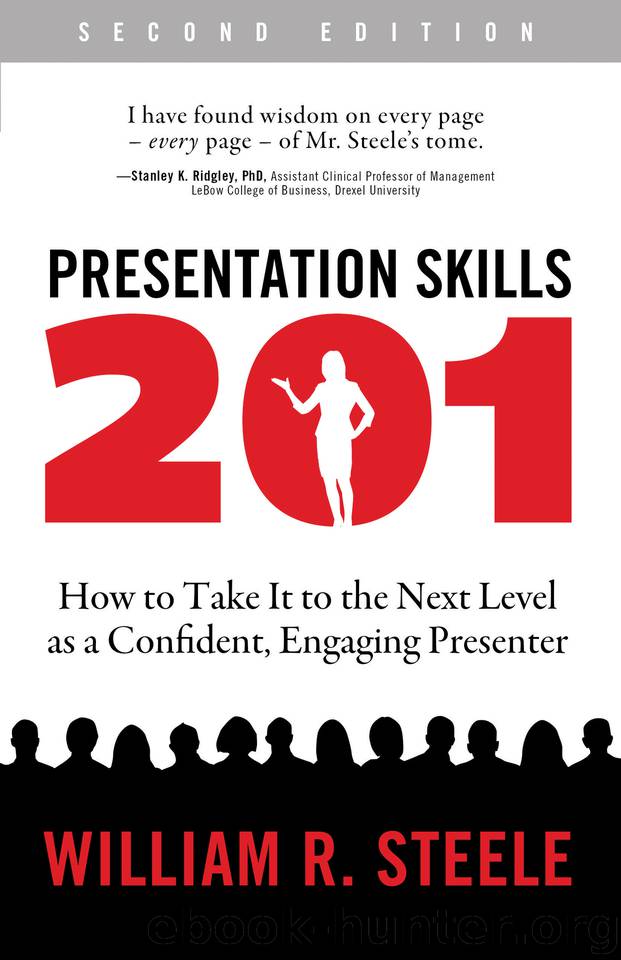Presentation Skills 201: How to Take It to the Next Level as a Confident, Engaging Presenter by Steele William

Author:Steele, William
Language: eng
Format: epub
Publisher: Erie Publishing
Published: 2016-05-22T16:00:00+00:00
Remember and Use Names
Did you know that everybody has the same favorite sound? Do you know what it is?
No, it’s not the sound of their child’s voice, although that’s high on the list. Their number-one favorite sound is the sound of their own name. Dale Carnegie made this observation in his classic book How to Win Friends and Influence People. He strongly recommended that anyone desiring to connect well with people learn names and use them in conversation.
Because a good presentation has a conversational quality to it, Carnegie’s advice fits right in. You can connect faster and better with your audience members by taking the trouble to learn their names and use them in your message. It brings about a sense of familiarity in the room, and you score points for making an effort to learn people’s names.
I had an experience with this phenomenon when I was distributing materials at a workshop and discovered that someone had forgotten to pack the name tents. I realized I was going to have to work without them, so I made a greater-than-normal effort to learn names. As participants showed up, I introduced myself and concentrated on the name they gave. Also, when no one was paying attention, I would drift back to the head table and scribble the names I’d learned on a rough seating diagram.
From the first minute of the workshop, I started using names. It wasn’t long before some whispered conversation led to someone raising a hand and asking how I knew so many people, given that it was my first time at the company. I acted innocently confused by the question and assured them I didn’t know anybody prior to the workshop. “But you know everybody’s name” was the comeback.
Even though we had exchanged names and shaken hands—and there were only ten of them—they had no expectation that I would remember what everybody had said. The fact that I had remembered led them to believe that I wasn’t the stranger they thought I was. Later on, a couple of them included on their workshop evaluations how impressed they were with my name recall.
This experience and many more since then have shown me just how powerful name recall can be for a presenter. It takes some work—particularly when your mind is on your presentation—but it pays off. The fast setup in familiarity with your audience generates early openness to what you are saying. That you paid attention to people’s names motivates them to pay attention to you.
Of course, I know what you’re going to say: “I’m lousy with names.” So try my seating-chart technique. You only have to remember names long enough to jot them down. Then you can put the chart next to your notes or laptop. It’s unlikely anyone will notice that you are regularly refreshing your memory. I’ve also learned that I can fill in some blanks as I listen to what people are saying during discussions. They will use each other’s names from time to time.
You can also study name-recall techniques.
Download
This site does not store any files on its server. We only index and link to content provided by other sites. Please contact the content providers to delete copyright contents if any and email us, we'll remove relevant links or contents immediately.
| Bookkeeping | Business Mathematics |
| Business Writing | Communications |
| Decision Making | Negotiating |
| Project Management | Running Meetings & Presentations |
| Secretarial Aids & Training | Time Management |
| Training |
Nudge - Improving Decisions about Health, Wealth, and Happiness by Thaler Sunstein(7690)
Deep Work by Cal Newport(7063)
Principles: Life and Work by Ray Dalio(6421)
The Doodle Revolution by Sunni Brown(4753)
Factfulness: Ten Reasons We're Wrong About the World – and Why Things Are Better Than You Think by Hans Rosling(4731)
Eat That Frog! by Brian Tracy(4525)
Thinking in Bets by Annie Duke(4218)
Hyperfocus by Chris Bailey(4111)
Visual Intelligence by Amy E. Herman(3775)
Writing Your Dissertation in Fifteen Minutes a Day by Joan Bolker(3723)
Ogilvy on Advertising by David Ogilvy(3604)
Hidden Persuasion: 33 psychological influence techniques in advertising by Marc Andrews & Matthijs van Leeuwen & Rick van Baaren(3552)
How to Win Friends and Influence People in the Digital Age by Dale Carnegie & Associates(3547)
How to win friends and influence people by Dale Carnegie(3470)
The Pixar Touch by David A. Price(3431)
Schaum's Quick Guide to Writing Great Short Stories by Margaret Lucke(3373)
Deep Work: Rules for Focused Success in a Distracted World by Cal Newport(3225)
Work Clean by Dan Charnas(3115)
The Slow Fix: Solve Problems, Work Smarter, and Live Better In a World Addicted to Speed by Carl Honore(3006)
